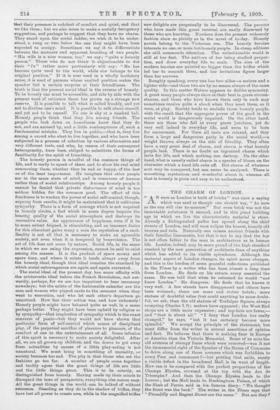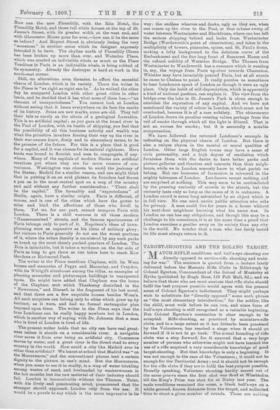THE CHARM OF LONDON.
"AlS sure as London is built of bricks" was once a saying i.. which was used as though one should say, "As sure as the sun will rise to-morrow." But even brick was not the immutable substance it seemed, and in this great building age in which we live the characteristic material is stone. Already a distinguished pallor has spread along the chief streets of London, and will soon eclipse the honest, homely old browns and reds. Naturally one misses ancient friends with their familiar lineaments, but that is not to say that the boy is not often father to the man in architecture as in human life. London, indeed, may be more proud of the high standard reached by the new generation of architects than of anything which has added to its visible splendours. Although the material aspect of London changes, its spirit never changes, and this is the burden of some graceful reflections published in the Times by a writer who has been absent a long time from London. He finds on his return every essential the same. He was told that when he returned he would "not know London." He disagrees. He finds that be knows it veey well. A few streets have disappeared and others have been widened; there are more and richer hotels; more statues of doubtful value (but could anything be more doubt- ful, we ask, than the old statues of Trafalgar Square, always excepting Charles I. ?); motors have appeared; the West End shops are a little more expensive; and top.hats are fewer,— and "that is about all." "I deny that London has really changed," he says, "but it has certainly become more splendid." We accept the principle of the statement, but must differ from the writer in several assertions of opinion and fact. He believes that there is nothing finer in Europe or America than the Victoria Memorial. Some of us miss the old avenues of stumpy limes which were removed—was it not the immemorial right of the Speaker of the House of Commons to drive along one of those avenues which was forbidden to every Peer and commoner fa—but putting that aside, surely a visible defect in the broadened Mall ie its want of length. How can it be compared with the perfect proportions of the Champs ,Elysdes, crowned at the top with the Arc de Triomphe ? And then the Champs Elysees leads to the Louvre; but he Mall leads to Buckingham Palace, of which the Shah of Persia said in his famous diary: "We thought the front was the back." The writer in, the Times says that "Piccadilly and Regent Street are the same." But are they ? llow can the new Piocadilly, with the Ritz Hotel, the Piccadilly Hotel, and those tall white houses at the top of St. James's Street, with its greater width at the west end, and with Gloucester House gone for ever,—how can it be the same as before? And Regent Street is obviously losing the very "sameness" in another .sense which its designer expressly intended it to. have. The skyline north of Piccadilly Circus has been broken up more than ever, and Waterloo Place, which was created an indivisible whole as much as the Place *Vendome in Paris is an indivisible whole, is being robbed of its symmetry. Already the destroyer is hard at work in the north-east corner.
Still, no alterations even threaten to affect the essential charm of London, which is its variety. There the writer in the Times is "as right as right can be." As be walked the other day he compared London with other great cities in other lands, and he decided that it has what none of them has,—"an element of unexpectedness," You cannot look at Loudon without seeing that it bears everywhere on its face the marks of its history. Some are new marks, some are old. They tell their tale as surely as the strata of a geological formation. This is no artificial capital ; as you gaze at the broad river in the Pool of London, with its bustle of shipping, you feel that the possibility of all this business activity and wealth was what the primitive invaders forcing their way up the river in their war-canoes knew, dimly and in elementary terms, to be the promise of the future. For this is a place that is good for a capital, and it was chosen for its natural rightness. Here trade was bound to flourish and men to congregate, if any- where. Many of the capitals of modern States are artificial creations put where they are for mere reasons of con- venience. Washington was chosen to avoid the jealousy of the States; Madrid for a similar reason, and one might think that in putting it on an arid plateau its founders had thrust a pen on to the most central spot on a map of the country and said without any further consideration : " There shall be the capital." The formality and "expectedness" of Berlin, again, have a similar origin. Paris is different, of course, and is one of the cities which have the power to seize and bind the affections of those who dwell in them. Yet we, for our part, cannot compare Paris with London. There is a chill wanness in all those modern '..H.aussmannised" streets, and the famous spaciousness of Paris belongs only to part of it. Napoleon's ideas of town. Planning were as expansive as his ideas of military glory ; but visitors to Paris generally do not see the worst portions of it, where the urban density is unrelieved by any such parks as break up the most closely packed quarters of London. The Bois is inimitable, but it takes a workman on the far side of Paris as long to get there as one takes here to reach Kew Gardens or Richmond Park.
The writer in the Times mentions Clapham, with its Wren houses and memories of Pepys and Macaulay, and Croydon, with its Whitgift almshouse among the villas, as examples of Pleasing memories and picturesque buildings in unexpected spots. He might have added that Clapham was the home of the Clapham sect which Thaekeray described in the " Newcomes," and Disraeli in the fragment of his last novel, and that there are a few exquisite houses besides Wren's. fill such surprises can belong only to cities which grew up by instinct, as it were, and had no formal rectangular plan unposed upon them. The writer in the Times says that the true Londoner can be really happy nowhere but in London, whioh is another way of saying with Dr. Johnson that a man who is tired of London is tired of life.
The present writer holds that no city can have real great- tress unless it stands on a considerable river. A navigable river saves it from ever being an artificial city. Commerce inoves by water, and a great river is the direct road to every country in the world. How could a city like Madrid ever be
Other than artificial P We learnt at school that Madrid was "on
the Manzanares," and the conventional phrase lent a certain dignity to the picture in one's mind. But the Manzanares, When you come to see it in reality, is a wisp of water triokling among wastes of sand, and husbanded by washerwomen in the hot months lest the raw material of their industry should fail, London is inconceivable without the Thames. Tempe, With his lively and penetrating mind, pronounced that the stranger should approach Loudon only from the sea. It would be a puzzle to say which is the more impressive in its way: the endless wharves and docks, ugly as they are, when one comes up the river to the Pool, or that urbane sweep of water between Westminster and Blackfriars, where one has left the serious shipping behind and looks front Westminster Bridge (Wordsworth's point of observation), and takes in the multiplicity of towers, pinnacles, spires, and St. Paul's dome, making a lofty background to the delicious curve of the Embankment and the fine long front of Somerset House and the refined solidity of Waterloo Bridge. The Thames front Westminster to Wandsworth has a romance which is wanting in, say, the voyage from Paris up-river towards Charenton. Whistler may have invariably praised Paris, but at all events he (same to Chelsea to paint. It really puzzles us sometimes to hear Londoners speak of London as though it were an ugly place. Only the habit of self-depreciation, which is apparently a kind of national pastime, can explain it. The view from the bridge over the lake in St. James's Park is alone enough to establish the reputation of any capital. And we have not mentioned the variety of colour in London, which must not be overlooked, because it is of a rare subtlety. The chiaroscuro of London draws its peculiar evening values perhaps from the veil of smoke through which all the light is filtered. That is not an excuse for smoke ; but it is assuredly a notable corn pensation.
We have followed the returned . Londoner's example in reflecting on the physical charm of London. But there is also a unique charm in the mental or moral qualities of London. Other large English towns may have a sense of civic personality, and a high degree of emulation which furnishes them with the desire to have better parks and picture galleries and theatres and concerts than their neigh- bours, while we in London scarcely know to what parish we belong. But our looseness of formation is mirrored in the mighty tolerance of London. Londoners resent nothing and are surprised at nothing. This may seem to be contradicted by the pressing curiosity of crowds in the streets, but the curiosity lasts only so long as the cause of it is unknown. A London crowd is never long astonished by an object which is in full view. No one need excite public attention who asks for privacy. A man could live for years in a house without his next-door neighbour knowing what his name was. In London no one has any obligations, and though this may be a challenge to his conscience, it is at the same time a proof that London exercises a gentler sway on its society than any city in the world. No wonder that a man who has fairly tasted its life must always return to it.










































 Previous page
Previous page